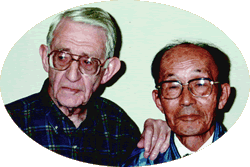|
You see, Keiko, since 1942 all prisoners of the Japanese have
detested their captors and with very good reasons. For 50 years
hatred has lain in our hearts. True a tiny minority are more ready
to forgive than others but the atrocities committed against us by
the Japanese soldiery are something the vast majority of us will
never forgive or forget. I hope I give you no offence when I do
this but I'd like to give you some idea of the depth of this hatred
in order to show the Pilgrimage as the miracle it actually is.
Throughout my 3½ years as a prisoner I found myself constantly
seeking some sign of pity or human concern from our guards as we
died in our thousands from ill-treatment, malnutrition and disease
but never did I find one. When a Japanese Camp commandant, in Thailand,
was told that a hundred prisoners had died that week, he roared
with laughter!
Slaving on the docks of Keppel Harbour, Singapore, we watched a
circle of Japanese sailors douse their pet monkey with petrol then
set fire to it. As the poor creature screamed and contorted, we
watched with horror but the sailors held their sides as they rocked
with laughter. Little wonder that we concluded that Japan was not
a nation of human beings but of uncivilised beasts.
Many books have been written about the Railway of Death we white
coolies and their slave-masters built through the jungles of Thailand
and the acres of graves of young men can be visited there today
and in Singapore. The sea journey from Singapore to Moji was conducted
under horrific conditions and many prisoners were buried at sea.
All these British boys who died at the hands of the Japanese were,
in truth, murdered.
Only the last fifteen months of our captivity were spent in Iruka
and the 300 men who trudged into that village were already physical
wrecks. As many Iruka boys testified Iruka camp was a tremendous
improvement on the Siamese jungle - but it was no bed of roses!
True we had dry shelter and clothing albeit rough but better than
the near nakedness of that Railway. Food however was very, very
scarce. My overall memory of Iruka was of always being hungry and
the killer-cold of winter. The cold, after 2½ years in the
tropics, proved the final blow to many bodies totally devoid of
fat to combat the bitter winds. Death called regularly and to us
the world was grey. Men were skeletons …I weighed 102 pounds and
Jack Shotton was like a baby-doll weighing only 74 pounds. To hold
on to the mind, your will to survive…When, at last, that glorious
day dawned and we were really free we vowed that when we got home
we'd never roam again..and thereby hangs a tale..
A chap called Ken Crossley who, before the war, sang with Henry
Hall and his Band, wrote a little ditty in Iruka..
F-R-double E-D-O-M
Always on our mind
F-R-double E-D-O-M
And if Fate be kind
We'll be going home again
Never more to roam again
F-R-double E-D-O-M
That's our Freedom Song
But it can now be recorded that a miracle happened and twenty of
us (including Doc. Wilson) did roam again!
And so you see, dear Keiko, that when we read the priest's article,
this is what happened:- Fifty years of sheer hatred gave way first
to amazement that Japanese people had, without any thought of publicity,
lovingly tended the grave of our comrades. We had never suspected
the Japanese of caring a tupenny damn for us, alive or dead. And
how amazement slowly turned to love as we embraced those dear villagers
of Iruka.. If only the Imperial Japanese Army had been endowed with
the gracious spirit of those dear ladies, there would never have
been a memorial in Iruka. I expressed that thought to Doctor Bob
Wilson during that wonderful service at Iruka and he added that
had that spirit been universal there would never have been a war.
So, for us, it was much more than a pilgrimage, it was the removal
of the cancer of hatred from our inner beings. Although most of
us can never forgive or forget…the HATRED has gone!
Arigatos and 'thank yous' however multiplied, cannot express my
gratitude to you, to the good Father, to the Iruka committee, the
London Committee and all those helpers and volunteers, all those
lovely people we met on that memorable journey through Japan. The
efforts of you all taught us that there is humanity in the ordinary
folk of Japan. Humanity and love too. And for fifty years I never
thought I'd ever say that. Now do you see what you did, dear Keiko,
you made the world a lovelier place and here's one septuagenarian
who thanks you from the bottom of his much-softened heart.
Love and admiration
From
Jimmy Walker
|


